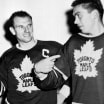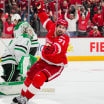TORONTO -- Borje Salming, the longtime Toronto Maple Leafs defenseman who was inducted into the Hockey Hall of Fame in 1996, said Wednesday he has been diagnosed with ALS.
The 71-year-old said he has been encountering speech issues and been feeling lackluster recently but was shocked to find out why, saying that he had received news "that has shaken my family and me."
"The signs that indicated that something was wrong in my body turned out to be the disease ALS, also known as Lou Gehrig´s disease," Salming said in a statement. "In an instant, everything changed.
"I do not know how the days ahead will be, but I understand that there will be challenges greater than anything I have ever faced. I also recognize that there is no cure, but there are numerous worldwide trials going on and there will be a cure one day. In the meantime, there are treatments available to slow the progression and my family and I will remain positive."
Amyotrophic lateral sclerosis, or ALS, is a progressive nervous system disease that affects nerve cells in the brain and spinal cord, causing loss of muscle control. There are more than 800 patients living with ALS in Sweden, and another 250 Swedes receive an ALS diagnosis each year.
"ALS is a devastating disease that not only affects the muscles but can also affect personality and cognitive functions," said Dr. Caroline Ingre, Salming's attending physician. "The people affected by this disease experience a progressive muscle weakness. In about 70 percent of diagnoses, the disease starts with symptoms from the spinal cord, which increasingly weakens the patient's arms and legs, while in about 30 percent it starts around the mouth and throat, leading to slurred speech and difficulties swallowing. These patients also often have an associated emotional impact that manifests itself as uncontrollable laughter or crying."
Dr. Ingre is the founder of the Karolinska ALS Clinical Research Center, which studies the causes, risks and spreading patterns of ALS, with the goal of identifying the disease early on to provide more effective treatment.
"With most ALS patients, breathing is affected with symptoms most often appearing first at night, while other typical signs are morning headache, daytime sleepiness, and shortness of breath during the day or when lying flat on the back," she said. "Therefore, patients are also treated at a respiratory clinic and, when breathing becomes affected, offered support administered through a face mask (noninvasive ventilation)."
Salming is receiving support from former teammates in Canada.
One of the first people he reached out to was fellow Hall of Famer Darryl Sittler, who played with Salming in Toronto from 1973-82. The 71-year-old helped Salming write the release that came out Monday.
"It's devastating," Sittler said. "We get together every spring, you marvel at the shape he's in, and then this. It's very challenging for him. It's frightening for him knowing there's no cure.
"Since he and his family reached out to inform me about 3 1/2 weeks ago, we've been trying to guide him and get him the best help we can."
As part of those efforts, Sittler contacted Mark Kirton, a former NHL forward who played 13 games for the Maple Leafs from 1979-81 and was mentored by Salming. The 64-year-old, who was diagnosed with ALS in 2018 and requires a wheelchair, immediately got in touch with Salming to help he and his family absorb the shock and provide guidance for the road ahead.
"I told him, 'King,' the goal here is survival and to stick around until they find a cure," Kirton said. "I Zoom frequently with he and his family, and I can tell you he's been very attentive to everything we've talked about, including how to procure the [medicines] he needs. It's important he gets them at the early onset.
"I'm going to be in touch with him regularly to help. So will Darryl, Lanny McDonald and Tiger Williams, some of his former teammates. They already have. I think Borje might be coming over to Toronto for Hall of Fame festivities in November and we'll all be waiting there to help."
Much like he's done with Salming, Kirton hosts regular video calls with 25-30 ALS patients and personal caregivers as part of ALS Action Canada, "to give those affected a stronger voice in pushing for approval of new treatments, funding and to discuss the development of potential cures."
Salming played 16 seasons with the Maple Leafs (1973-89) before finishing his NHL career with the Detroit Red Wings (1989-90). He had 787 points (150 goals, 637 assists) in 1,148 games and was the first Sweden-born player to be inducted into the Hockey Hall of Fame.
In 2014, his statue was added to Legends Row outside Scotiabank Arena in Toronto. His No. 21 was retired by the Maple Leafs in 2016, and he was named one of the 100 Greatest NHL Players one year later.
"Since I started playing ice hockey as a little kid in Kiruna (Sweden), and throughout my career, I have given it my all, and I will continue to do so," Salming said. "Right now, I rest assured that I have my loving family around me and the best possible medical care."
The Sweden National Junior Team paid tribute to Salming during the 2022 IIHF World Junior Championship when the coaching staff wore number 21 stickers on their lapels during each game.
"These players are pretty young, but for us coaches and staff he's special," Sweden coach Tomas Monten said Wednesday. "We just heard the news (Wednesday morning) and we talked about it. It's just sad news, and we just hope that everything goes well. He's one of the greatest players we've ever had.
"If you've ever been to Toronto and get into a taxi cab and say you're Swedish, you get all the stories. We just hope it goes well. It seemed like a good thing to do."
Sweden players were too young to see Salming play live, but they understood the impact he had on hockey in their country and beyond.
"He's a legend in Sweden," said Sweden captain Emil Andrae (Philadelphia Flyers). "I don't remember that much of him as a player, but I've seen videos on YouTube. The whole crowd is standing up for him in Toronto at the Canada Cup in 1976. That's unbelievable. We tried to support him a little bit; we're very sorry for him."
NHL.com staff writer Mike G. Morreale contributed to this report


















